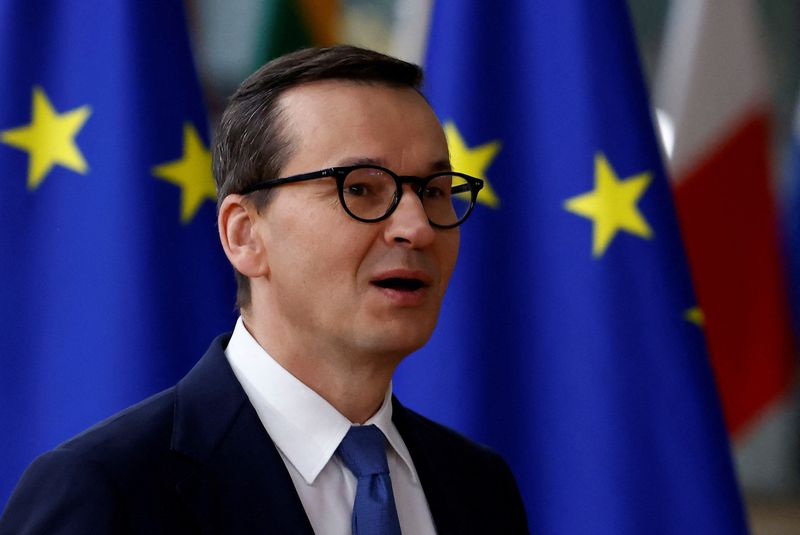Poland holds up EU deal on minimum corporate tax, aid for Ukraine
2022.12.15 03:29
[ad_1]

© Reuters. FILE PHOTO: Poland’s Prime Minister Mateusz Morawiecki attends a European Union leaders’ summit in Brussels, Belgium October 21, 2022. REUTERS/Yves Herman
BRUSSELS (Reuters) – Poland was on Thursday holding up the European Union’s formal adoption of a minimum corporate tax for large companies and, by extension, also blocking a whole package of other deals, including financing for Ukraine in 2023, diplomats said.
The minimum tax, along with 18 billion euros ($19 billion)for Ukraine next year, the approval of Hungary’s recovery plan and the suspension of some EU budget funds for Budapest were all part of a complex deal reached by EU governments on Monday night.
The pact was to be signed off in what is called a “written procedure” by Wednesday, but Poland has twice demanded an extension of the deadline for this, the latest of which is now 12:00 p.m. (1100 GMT) on Thursday.
“It’s the whole package that is held up over Polish issues with the global tax that no one understands,” one EU diplomat said. “We have no clue what (Polish Prime Minister Mateusz) Morawiecki wants or will do – he’s already agreed to the tax in spring,” the diplomat said.
EU diplomats speculated Warsaw may be holding the whole package hostage to get a clear commitment from the rest of the 27-nation bloc that Poland would get the tens of billions in EU recovery funds now blocked by a rule of law dispute with Brussels.
“On Monday we heard that they needed time to get the justice minister on board. Not sure how these extensions intertwine with what’s going on with him and with the measures presented to parliament on judicial independence,” one official said.
The issue is likely to come up at a summit of EU leaders in Brussels on Thursday.
The global minimum corporate tax of 15% was agreed by 140 countries in the Organisation for Economic Cooperation and Development in 2021 to prevent large international firms from shifting profits around the globe to cut their tax bills and thereby eroding countries’ tax bases.
The minimum tax is to apply to companies with an annual turnover of at least 750 million euros and each EU country will have to adopt it into national law by the end of 2023. Large firms will have to pay the minimum rate from the start of 2024.
($1 = 0.9399 euros)
[ad_2]
Source link








